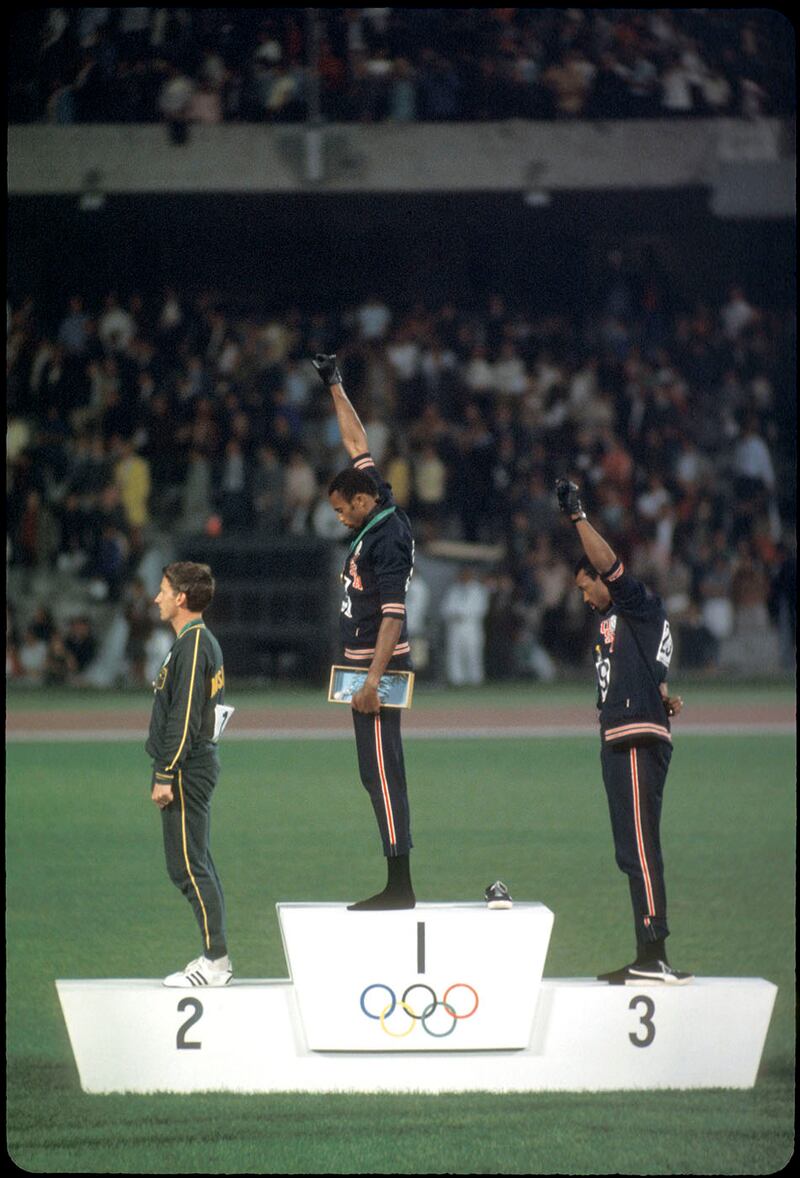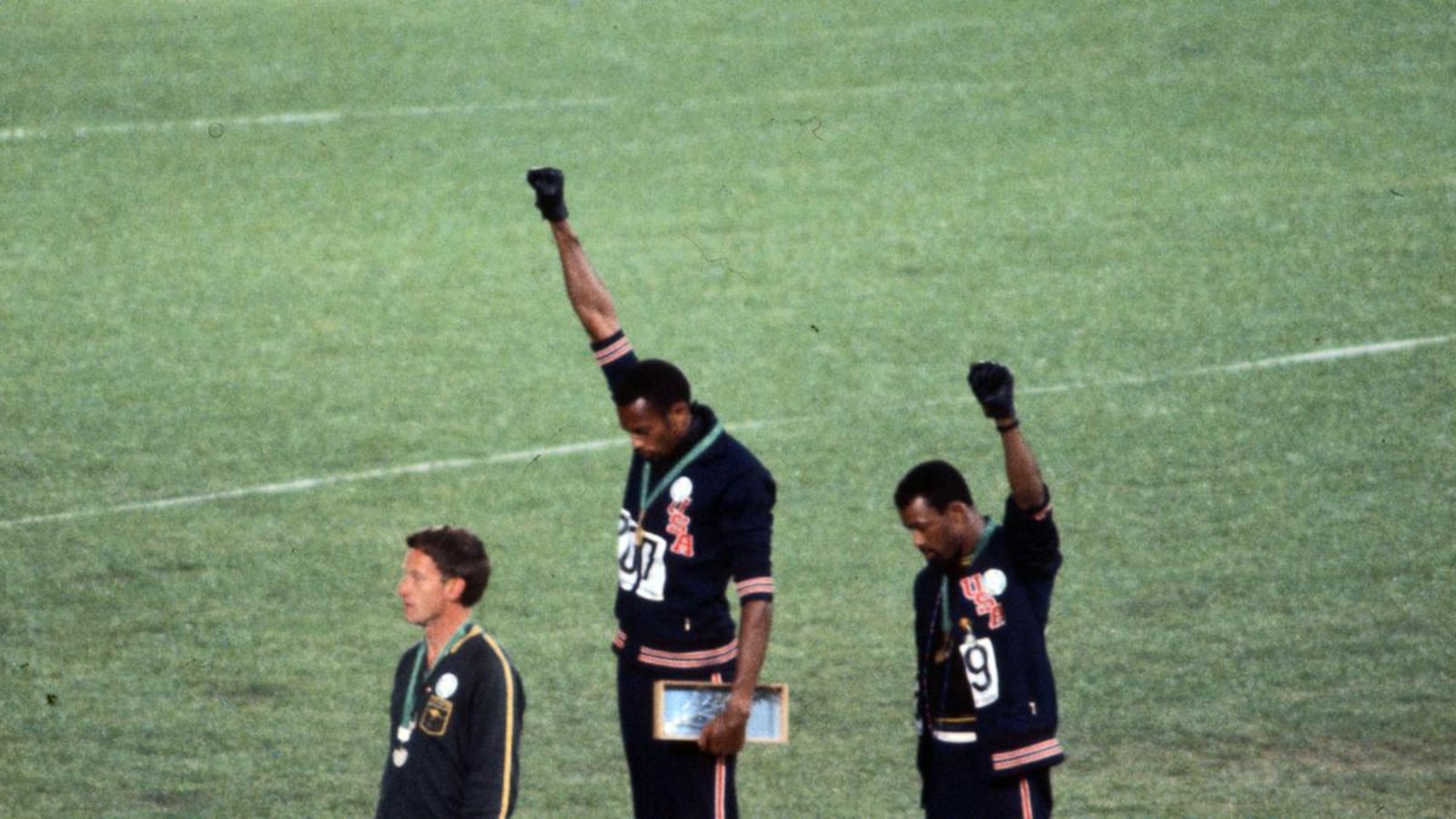President Trump keeps lashing out at Black athletes, trying to change the subject from his inner circles’ guilty pleas and verdicts back to NFL players protesting the anthem, calling Colin Kaepernick, who wouldn’t kneel for the anthem, a “son of a bitch” and LeBron James dumb for good measure.
The insults seem at once pointed but almost generic, as if he sees these athletes as interchangeable parts, devoid of their own will. He seems easily shocked when they prove that they aren't.
Trump is a very new kind of president, but he’s tapped into a long tradition of Black athletes using their prominent platforms to speak up about American injustice, and powerful fans then telling them to keep quiet and just play.
In 1968, the same year our future commander in chief’s bone spurs saved him from serving his country and fighting in Vietnam, two African American men about his age, U.S. Olympians Tommie Smith and John Carlos, made a statement at the summer Olympic Games in Mexico City. After Smith won the gold medal and Carlos the bronze in the 200 meter race, they and Australian silver medalist Peter Norman all had human rights badges on their jackets. When the U.S. anthem played and the men turned to face the flag, Smith and Carlos raised black-gloved hands in the Black power salute to protest in perhaps the most potent political gesture of a tumultuous time.
The men had prepared for the moment, with both of them in black socks with no shoes to represent black poverty. Smith wore a black scarf to represent Black pride and Carlos had a necklace of beads “for those individuals that were lynched, or killed and that no-one said a prayer for, that were hung and tarred. It was for those thrown off the side of the boats in the middle passage."

Tommy Smith (307) (1st place) and John Carlos (259) (3rd place) of the US raise their fists in the "Black Power Salute" during the playing of the national anthem at the Olympics in Mexico City, Mexico.
NCAA Photos/GettyAs Smith and Carlos stood there with their fists raised, the stadium went silent. Then the crowd started to boo them and to scream the Star-Spangled Banner. Smith later recalled it as a way for the many Americans in the stadium to tell him and Carlos: “Oh, you anti-American sons of bitches. We’re going to shove the shit down your throat! They screamed it to the point where it seemed less a national anthem than a barbaric call to arms.”
Both men were booed as they left the podium, and an Olympics spokesman condemned their "deliberate and violent breach of the fundamental principles of the Olympic spirit."
But the photo of Smith and Carlos on the podium became iconic, the symbol of athletic protest in that era.
Historian Kevin Witherspoon has said of these Games, and their silent act, that “they united politics, culture, and diplomacy, and athletics as no Olympics before or since.”
Smith and Carlos took their public stand at a time when the country was embroiled in the Vietnam War, the Civil Rights Movement, the first wave of feminism, political assassinations of Dr. Rev. Martin Luther King, Jr. and Robert F. Kennedy. US cities were the sites of riots and all of this was on TV, beamed to the masses.
Smith and Carlos risked much. They were ejected from the stadium and the Games and removed from the team, ending their track careers. For a short period each then played professional football, Smith for three seasons with the Cincinnati Bengals and Carlos for one with the Philadelphia Eagles and another in the Canadian League.
In 1968, though, the space between the mob and those who aspired to lead it was greater; law-and-order candidate Richard Nixon said nothing about the Olympic moment.
In 2018, Trump’s reelection campaign is sending emails from the president himself to supporters calling ESPN “spineless” and wrongly suggesting the network stopped broadcasting the anthem to placate those protesting players (in fact, it and other networks have long ignored the anthem, often going to commercial while it played).
His call to Make America Great Again seems like a perverse reading of what the athletes speaking up today are demanding from our country all these years after the poet Langston Hughes wrote in 1936 that it was time to “Let America Be America Again,” concluding:
O, yes, I say it plain
America never was America to me
And yet I swear this oath—
America will be!
Out of the rack and ruin of our gangster death,
The rape and rot of graft, and stealth, and lies,
We, the people, must redeem
The land, the mines, the plants, the rivers.
The mountains and the endless plain—
All, all the stretch of these great green states—
And make America again!






